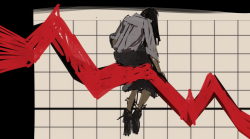As America kicks into the new millennium with war, contradictions that have lurked beneath the surface of our society emerge everywhere, including Georgetown University. The author James T. Farrell wrote that “America is so vast that almost everything said about it is likely to be true, and the opposite is probably equally true.” Many activists feel outraged with the war in Iraq, while others view the struggle as a hopeless upward battle. In Red Square, I read remarks such as “Protest animal rights, LGBT research, living wage and fair trade coffee,” as if the writer assumes the many campaigns advocating social and economic justice are part of one unpatriotic-hippie-communist conspiracy. How can such ignorance persist in a modern educational institution? The cold world that I think about everyday-from economic violence in Latin America to the war in Iraq-is reinforced by these views expressed on the walls of Red Square.
The bitterness of certain people on this campus characterizes the relationship between America and the rest of the world. It is the classic relationship between the powerful and the powerless and the endless cycle of violence, racism and exploitation that we euphemistically call “the history of the world.” As we sit comfortably in our power-point classrooms, naively gulping down the neo-liberal conceptions of world trade and the realist perspectives of politics, we rarely think about the implications these ideas have for people all over the world.
The wrath of our country’s imperialist doctrine is almost too terrible to comprehend. Naturally, we build defense mechanisms, claiming that “war is justified in order to free the Iraqi people and bring them democracy.” However, freedom and democracy have always been relative concepts for the United States. Why weren’t we espousing these ideals in the 1980s as we sat at the negotiating table, supplying Saddam Hussein with weapons? Where was “freedom” when we supported Efra?n R?os Montt-the U.S. Army-trained Guatemalan dictator responsible for the rape and slaughter of hundreds of innocent Mayans? The list goes on and on.
Another argument is that it is our right to play the role of the planet’s Superman. However, as we disarm dangerous regimes, has anyone stopped to think about our own nuclear weapons arsenal, by far the largest in the world? How can we gloss over the Bush administration’s “refusal to rule out” the use of nuclear weapons in our war in Iraq? The United States is the only country in the world to set the precedent for using a nuclear weapon on civilian populations. Would Rumsfeld welcome U.N. weapons inspectors if they decided to take a field trip to the Pentagon? What about other nuke-holding nations like India or Israel, neither of whose militaries sport squeaky clean human rights records?
For many Americans who support this war, the “no blood for oil” assertion is an absurd anti-capitalist conspiracy theory that is illegitimate due to the “fact” that the United States government is too rational to put American lives on the line for petroleum interests. However, oil has always been a central concern as it is essential to the flow of free trade. How can our government kill for economic and hegemonic purposes, as opposed to the altruistic cause of “defending freedom” from the evil Saddam? For many, the first option is too unspeakable to consider-as happy Americans, we can safely assume the best intentions of our national cause.
Unfortunately, my outlook is grim. The reality of this war has brought many of our country’s immoralities to the forefront. “Anti-Americanism” does not translate into jealousy; it’s a rejection of our gluttonous lifestyle of wealth and power, and the human cost we are willing to pay to preserve it. When I read the public opinion polls in favor of the war and gaze at absurd signs in Red Square, I see that Americans are compelled to flip off the world. Many Georgetown students feel we should hold hands and “give war a chance.”
One thing cannot go unnoticed-the growing strength and dedication of the fledging antiwar movement. “Anti-Americanism” marginalizes anti-war activists in the global struggle against our government’s policies. However, giving up is a surefire way to see this injustice continue. We should use our position within the “belly of the beast” to our advantage. Remember the words of Indian activist Arundhathi Roy: “We be many and they be few. They need us more than we need them.”
Sonia Mukhi is a sophomore in the School of Foreign Service. She’s too left for you.




